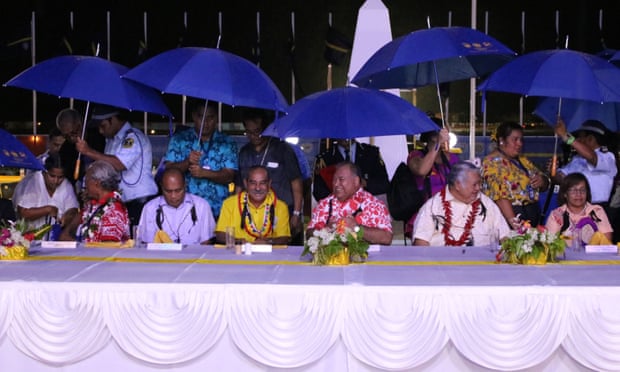YAREN,05 SEPTEMBER 2018 (THE GUARDIAN) – A visa row between China and host nation Nauru almost derailed the Pacific’s largest annual diplomatic summit, it emerged on Tuesday, exposing sensitivities about Beijing’s rising influence in the region.
As formal discussions began at the 18-nation Pacific Islands Forum, leaked letters revealed some members threatened to boycott the meeting over Nauru’s treatment of Chinese delegates.
Nauru does not have diplomatic relations with China, instead recognising self-ruled Taiwan, which has paid for much of the infrastructure being used to host the PIF summit.
Beijing and Taipei have vied for diplomatic influence in the Pacific for decades, with both sides offering aid and support to small island states in return for recognition.
In an apparent bid to tweak the nose of Chinese delegates, Nauru refused to stamp entry visas into their diplomatic passports, instead saying it would only process their personal passports.
While seemingly a minor detail, it provoked a furious response from other PIF members, many of whom receive development aid and concessional loans from Beijing.
China claims sovereignty over the democratic island and relations between the two have worsened since President Tsai Ing-wen came to power in 2016, as her government refuses to acknowledge that Taiwan is part of “one China”.
Samoa Prime Minister Tuilaepa Sailele Malielegaoi sent a letter to Nauru President Baron Waqa threatening to withdraw from the summit and warning other leaders were likely to follow suit.
“Your unilateral action as President of Nauru is a dangerous precedent that I believe may not be accepted by forum leaders,” he wrote in a letter obtained by AFP.
He added: “The decision taken by your government questions the integrity, credibility and foundation of our organisation.”
Waqa eventually relented and proposed a compromise in which the Chinese delegation had their visa acceptance letters stamped, rather than their passports.
China does not belong to the PIF but is one of 18 countries that attends as a “dialogue partner” for discussions with member nations.
Australia’s Lowy Institute think tank estimates China provided US$1.78 billion in aid, including concessional loans, to Pacific nations between 2006-16.
The “soft power” wielded by Beijing has alarmed Australia and New Zealand, with both countries boosting their own aid programs in a bid to maintain influence in a region they regard as their backyard. China is set to overtake Australia as the largest donor to the Pacific region, after pledging US$4bn in aid to the region last year..




